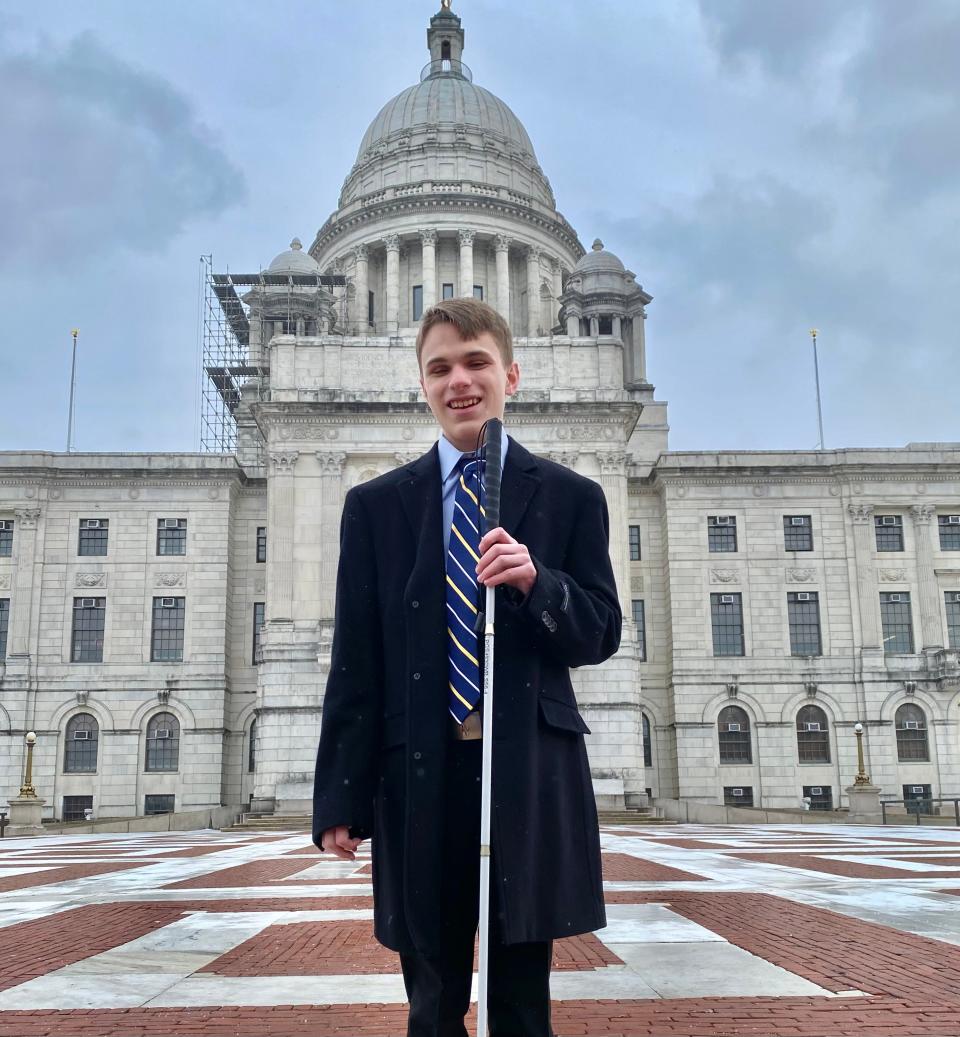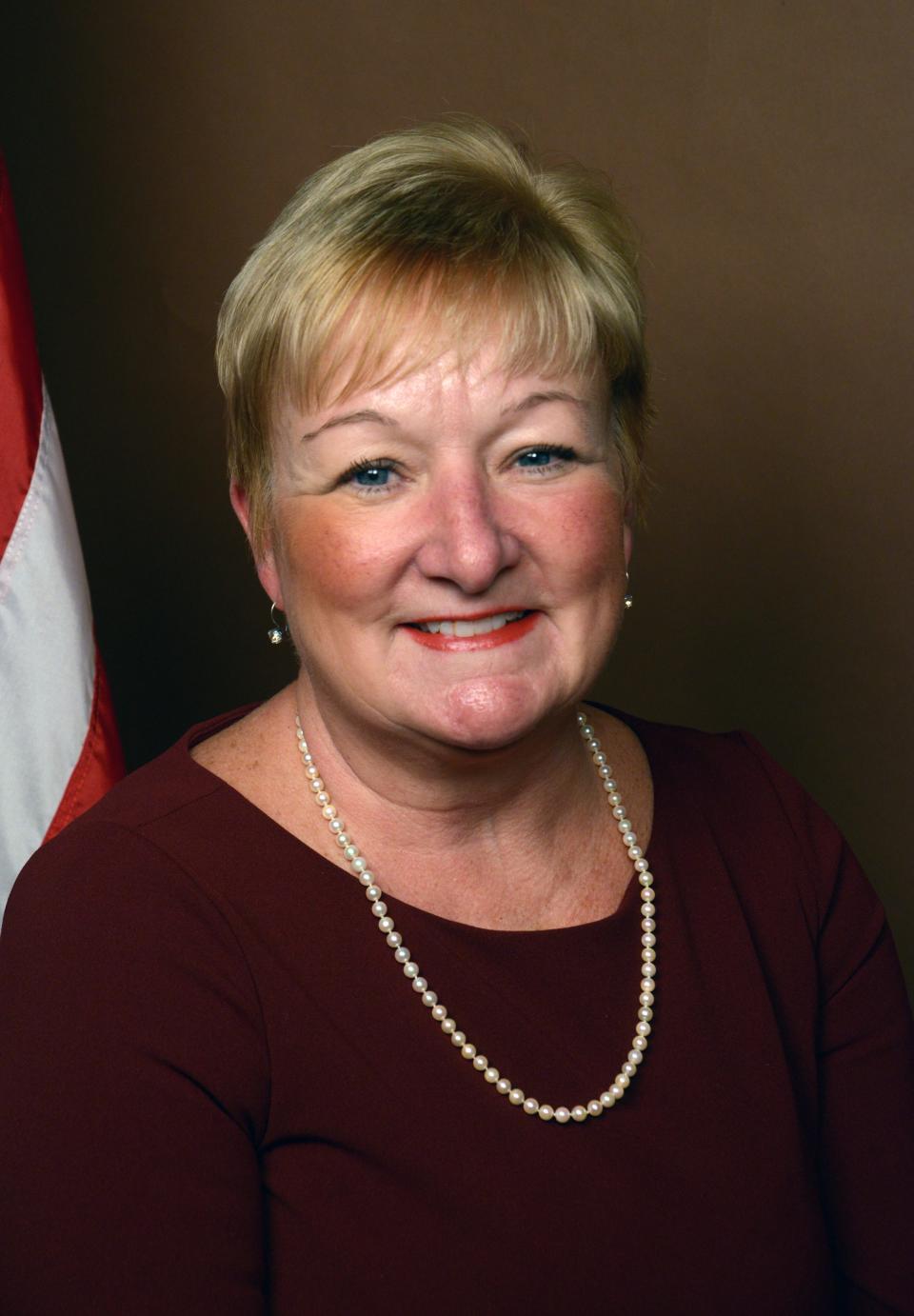RI's first blind page found a problem with school gym classes. Here's his plan to fix it.
The truth of being a state legislator is you can go years without creating a bill that becomes law.
But a local teenager is on the verge of doing exactly that.
I should add one other thing about him.
He happens to be a teenager who is blind.
His name is Ryan Lukowicz, now 18, and part of me is not surprised. Ryan has long been a force of nature, two years ago becoming the first blind page ever at the State House.
He’s long been a political junkie, with his own "candidates" podcast that among others landed Gina Raimondo and Sheldon Whitehouse as guests. One of his favorite shows to watch – I’m not kidding – is Rhode Island Capitol TV, where they livestream committees and legislative sessions.
I’ll bet Ryan could one day be elected to office.

But apparently, he didn’t need that to introduce a bill that’s now about to be voted on, an achievement unto itself.
It didn’t stem from his State House page job. It was a simply a need he saw as a high school student with a disability – in his case at North Kingston High School.
Such students usually take adaptive phys-ed classes. Ryan has been doing that for a while. It’s usually 10 or so kids with various disabilities doing separate activities – soccer, basketball, exercising.
The classes work best when each student has a volunteer peer to guide them. But usually, there are only a handful of such student partners – high school kids have to prioritize required classes with credit.
That got Ryan thinking.
Maybe, he felt, there would be more PE peers if they got credit for being adaptive class partners.
But it wouldn’t work to push the school or even the Department of Education to make such a change. A new category of class credit in Rhode Island public schools needs legislative approval.
So Ryan proposed a bill to do it.
He got North Kingstown Rep. Julie Casimiro to sponsor it, and she told me it’s amazing that in just months, Ryan has moved it toward a vote in both State House chambers.
As a comparison, Casimiro has for seven years tried to push a bill of her own to reimburse communities for efforts that protect Narragansett Bay, but so far no luck, in part because it’ll take new funding, always a challenge. That’s typical, bills taking years – maybe even forever. Indeed, some reps have never conceived and shepherded a new bill into Rhode Island law.

But Ryan Lukowicz is likely on the brink of doing it.
He’s now a senior weighing college choices. Among those on his list are Stonehill, Wheaton and Roger Williams. That’ll mean learning his way around a new campus, but Ryan has done it at high school and the State House, so he’s ready.
I asked how his push for the bill started.
Every year, he explained, graduating North Kingstown students have to do senior projects in categories like hosting an event, conducting a study or improving a system.
That got him focused.
He told me there are a few dozen kids with disabilities at his school who take adaptive gym classes. Many have autism or developmental disabilities. A few have physical challenges like Ryan's or use a wheelchair.
Patinkin: North Kingstown teen will make history as first blind page at RI State House
Usually, each adaptive student pursues a separate activity during the same class. The day I talked with him, Ryan had done some weightlifting while others worked on soccer, or dance to get their energy out. Some also follow mental health pursuits, such as a mindfulness routine.
Since there are only one or two teachers, kids get a lot more out of it, Ryan told me, if they have a peer helping out.
Usually, only a few do, since peers don’t get credit and still have to take an additional PE class. That can be a challenge, said Ryan, for kids who aren’t sports types and wouldn’t be drawn to the gym twice in one day.
But if they got PE credit as adaptive peers, he has no doubt that many more would step up.
So Ryan decided to introduce a bill.
That’s not his area as a State House page, so this was new to him. But he did know he needed sponsors in both the House and Senate, so he called Casimiro and his state senator, Alana DiMario.
Both loved the idea. It hit close to home for Casimiro, since she often works at North Kingstown High as a substitute teacher.
She even experienced the problem firsthand when assigned to an adaptive PE class that Ryan was in. There were around 10 kids and three volunteer students.
“The peers really kept them active,” she told me. Having more would make a huge difference.
And Casimiro sees a social benefit, too.
“It would incentivize students to be more inclusive and meet kids they otherwise might not have been able to meet in their own peer groups,” she said.
Ryan feels the same.
“It would be a steppingstone to more permanent relationships,” he told me.
It’s deeply meaningful, they both said, when kids form connections with others who live with disabilities.
Casimiro added that it can even open peers to career tracks. In one case during the adaptive class where she subbed, one of the volunteers was a girl who decided she wants to go into special education.
What is 'Jeopardy!'?: This game show loves RI, and Mark Patinkin has answers to questions
Since this was Ryan’s project, Casimiro told him he’d have to shepherd it, and he did, working out details with both the North Kingstown superintendent and the Rhode Island Department of Education.
As is done with all bills, the concept was then passed to the State House Legislative Council office – attorneys and researchers whose job is to actually draft legislation. In this case, it technically would be an amendment to the Rhode Island Board of Education Act.
Thus was born House bill H-7561 and Senate bill S-2280.
Last week, Ryan testified at hearings on the bills at both the House and Senate education committees. He did so well that Sen. Lou DiPalma said he hoped Ryan didn’t plan to run against any of them in the near future.
Both committees voted for the legislation to go forward – a big milestone. A lot of bills die in committee.
But not Ryan’s.
I was only able to find one other case of a teen behind a Rhode Island law – in 2022, Narragansett High School student Gary Jennison got a bill passed naming the trilobite as the official Rhode Island fossil.
Ryan’s bill is due for a vote in each chamber this week, and if it passes, and is signed by the governor, it will add to that rare history – a new law created by a teenager, not to mention one who is blind.
I asked Ryan how he’s overcome that personal challenge to achieve such impressive things.
He says he has a simple philosophy – he focuses not on problems, but on what he can achieve.
Which is something he clearly has done with his legislative bill.
And with life itself.
mpatinki@providencejournal.com
This article originally appeared on The Providence Journal: Blind RI State House page Ryan Lukowicz seeks gym class legislation

